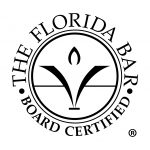Florida adopts laws to authorize Community Property Trusts in Florida.
Just in 2021, the Florida Legislature passed a new statute allowing the creation in Florida of Community Property Trusts.
How can a Community Property Trust save Capital Gains Taxes?
Even without a Community Property Trust, after both spouses have passed away, the heirs get a “step-up” in basis. A “step-up” in basis allows the property to be sold after death without paying a large capital gain. A Community Property Trust allows a surviving spouse to sell property without paying a capital gains tax: That is, the surviving spouse can sell the property, and re-invest it into something else, without having the dollars for re-investment reduced by capital gains taxes. …… in other words, without such a trust the capital gains tax can only be avoided after both spouses die, the trust allows the surviving spouse to sell without taxes ….. without waiting for the second death.
For which clients are Community Property Trusts advantageous?
A Community Property Trust may work well for some clients who have a long term marriage, where the bulk of the assets they own were generated and developed during the marriage. In such a situation, the spouses will be very likely to end up with a Community Property division (50-50) in the case of divorce or separation. Also, Community Property Trusts will be more attractive for clients who own property that has gone up in value, or rental real estate that has been owned for a number of years (here it doesn’t matter if the property has gone up in value, because depreciation lowers the basis of property, creating capital gain even when the real estate hasn’t increased in value).
Impact on marital rights?
A Community Property Trust will create an absolute 50-50 division of assets in case of divorce or separation.
Is a Community Property Trust for all Estate Planning clients?
Most definitely not, Community Property Trusts are great for some —- but are not for everyone. Here are three situations to consider:
A) No rental real estate and/or other assets that have gone up in value. To begin with, clients who do not have significant amount of property that has increased in value may find the Community Property Trust less attractive.
B) Where the 50-50 nature of Community Property Trusts does not meet the clients needs. For clients that have assets developed prior to marriage, or inherited from their own family, the Community Property Trust would likely change the rights in the case of divorce or separation (i.e. change to a absolute 50-50 division). This may not meet client objectives.
C) Actively traded stock/bond/mutual fund portfolios. Any Real estate except for the primary residence is a natural for the Community Property Trust. Such real estate that are rentals have depreciation, and the IRS requires depreciation. This applies whether you deduct it or not, under the “allowed or allowable” IRS rules.
However, the same concepts of avoiding capital gains in the Community Property Trust applies equally well to stocks and bonds. The difference here is that some stock and bond portfolios are “actively traded.” In fact in some active mutual funds, the average “turnover” of stocks bought by the mutual fund are a year or less! Some individual portfolios are also actively traded. In this situation, the capital gains to be avoided may be rather small, and not worth the effort. On the other hand, some index mutual funds have a very low “turnover,” and likewise some individual investors have very low turnover. Warren Buffett suggests the best holding period to be “forever!” For such market investments that have been invested with low turnover, there could be a substantial amount of capital gains that could be avoided.
D) Conclusion. Clients in these three situations may prefer to stay with a regular Living Trust, instead of the Community Property Trust.
Is there any uncertainty or risk?
— Concerns about such trusts being “risky” may be overblown:
Several other states have for some years allowed Community Property Trusts. IRS challenges do not appear to have resulted …. in other words, in several other states taxpayers have been doing these trusts, without the IRS even mounting any known challenges. The IRS would have to “take-on” all of these states, and Florida is a large swing state for the IRS to try to take on. Also, it is a difficult position for the IRS to defend, as there are quite a number of states that have community property (but skipping the trust vehicle). Should the IRS go after the Community Property Trust, that could cause voters to start to question the other states that have Community Property outside a trust.
— There is no absolutely controlling IRS precedent. Some commentators suggest that the IRS may at some point try to challenge the states that are allowing Community Property Trusts.
— for some clients it may be really “risky” not to employ such a trust:
If the spouses have stock market investments, small businesses owned, and/or real estate (that is NOT their home, where there may be a limited amount of exclusion of gain for the IRS) that has gone up in value, the clients could end up paying a substantial capital gains tax after the death of the first spouse. Such a capital gains tax could be avoided if the Community Property Trust is employed. Of course, such an avoidable capital gains tax only applies if the surviving spouse sells the property before death. There is a “step-up” in basis that applies at the second death, even without a Community Property Trust. The point of the Community Property Trust is that a surviving spouse would be able sell property tax free, without hanging onto the property until death.
Give me an Example:
EXAMPLE: A common example may be where one spouse manages and controls rental properties. With some spouses, the surviving spouse is well prepared to continue the rentals after the first death. But in other marriages the surviving spouse may have no interest or ability to handle the rentals. With a Community Property Trust the capital gains tax can be legally avoided by waiting for the first spouse to pass away. At that point the surviving spouse can sell the assets, and reinvest the full sales proceeds in the stock or bond markets (without any reduction due to capital gains taxes).
Community Property Trusts are not limited to rental real estate. See above for discussion of different types of stock portfolios, and whether they likely will benefit from such a trust.




